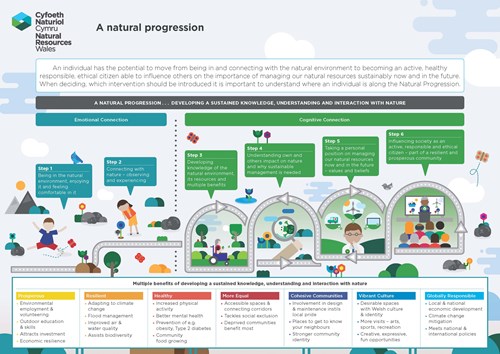Benefits for health and learning
Want to learn about the benefits of outdoor learning? Need to justify taking your learners outdoors? Check out our information posters.
We're keen to help and encourage everyone to get outside, enjoy and connect with the natural environment.
Evidence shows that being outside and connecting with nature can provide many benefits including:
We have developed our natural progression model to help explain that everyone has the potential to move, step by step, from being in and connecting with the natural environment to establishing lifelong positive behaviours that will encourage all of us to look after our world.

Download the natural progression poster
Nature needs to be experienced first-hand before a connection through enjoyment can develop!
Once we feel comfortable having spent sufficient time outdoors, a relationship begins to form. The better this experience, the more positive the results.
We can all take positive steps to encourage and establish the connection:
Once we have developed a connection to the natural world, our knowledge of natural processes and systems begin to take shape.
As we gain more new knowledge and understanding we can move between steps 3 to 6 many times.
With time and experience a deeper level of understanding of ecosystems and natural resources matures, allowing us to consider how our actions have an impact on the environment.
We can all take positive steps to improve our knowledge and understanding:
Now that a deep understanding of our place within the natural world has developed, we form our own local and global opinions eg our personal stance on climate change or attitude to recycling.
With a connection to nature in place, an understanding of the natural environment and a personal standpoint, we can influence and educate others.
We can all take positive steps to educate and influence others:
NRW has developed these Natural Progression steps in order to support the growth of the ethical and informed citizens our new Welsh curriculum seeks to develop.
For further information contact: education@naturalresourceswales.gov.uk